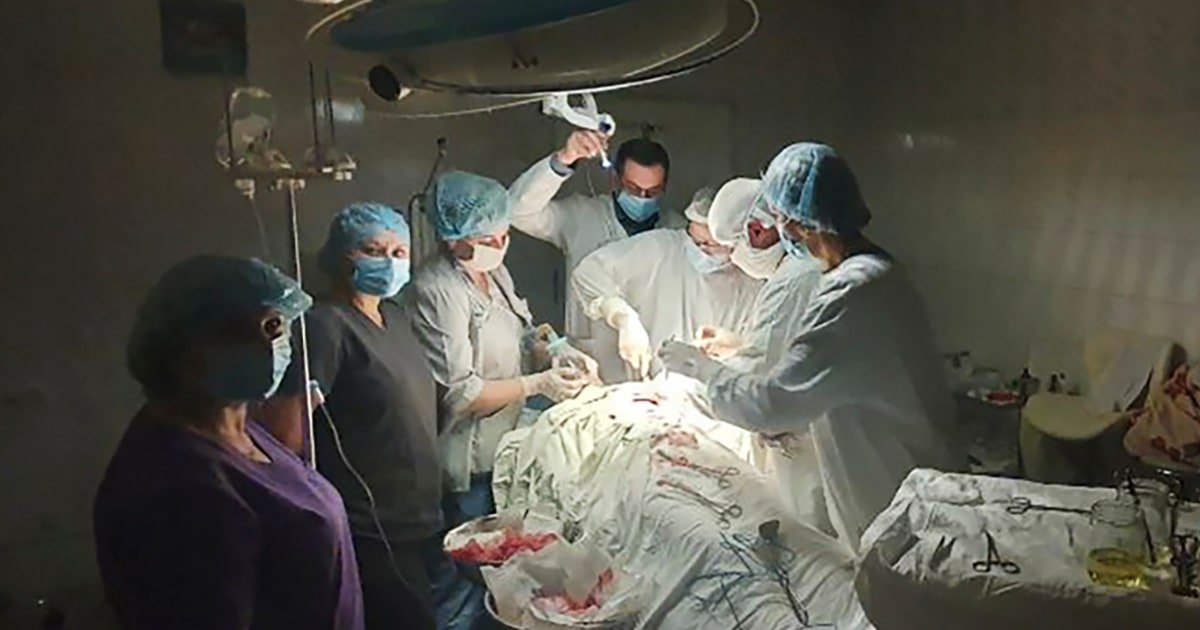Last week, the Kyiv Heart Institute posted on its Facebook page a video of surgeons operating on a child’s heart with only light coming from headlights and a battery-powered flashlight.
“Rejoice, Russians, a child is on the table and during an operation the lights went out completely,” Dr. Boris Todurov, director of the institute in the capital, said in the video. “Now we will start the generator; unfortunately, it will take a few minutes.”
The attacks have also affected hospitals and outpatient clinics in southeastern Ukraine. The WHO said in a statement last week that it had verified at least 703 attacks between February 24, when Russian troops entered Ukraine, and November 23.
The Kremlin has denied accusations that it targets civilian facilities. Kremlin spokesman Dmitry Peskov insisted once again last week that Russia is targeting only sites «directly or indirectly related to military power.»
But last week, an attack on the maternity ward of a hospital in eastern Ukraine killed a newborn and seriously injured two doctors. In the northeastern Kharkiv region, two people were killed after Russian forces shelled an outpatient clinic.
In Lviv, Duda said the explosions occurred so close to the hospital that «the walls were shaking» and doctors and patients had to go down to the basement shelter, something that happens every time an air-raid siren sounds.
The hospital, which specializes in cancer treatment, performed only 10 of the 40 operations scheduled for that day.
In the newly recaptured southern city of Kherson, without power after the Russian withdrawal, crippled elevators are a real challenge for paramedics.
They have to carry immobile patients down the stairs of apartment buildings and then carry them back up into operating rooms.
In Kherson, where it begins to get dark after 4 pm in late November, doctors use headlamps, phone lights and flashlights. In some hospitals, key equipment is no longer working.
Last Tuesday, Russian attacks in the southern city injured 13-year-old Artur Voblikov, and doctors had to amputate his arm. Medical workers carried the teenager through the dark stairs of a children’s hospital to an operating room on the sixth floor.
“The breathing machines don’t work, the X-ray machines don’t work. … There is only one portable ultrasound machine and we carry it around constantly,” said Dr. Volodymyr Malishchuk, head of surgery at a children’s hospital in Kherson.
The generator used by the children’s hospital broke down last week, leaving the facility without any power for several hours. Doctors wrap newborns in blankets because there is no heating, said Dr. Olga Pilyarska, deputy director of intensive care.
The lack of heat makes it difficult for patients to operate, said Dr. Maya Mendel, from the same hospital. “No one is going to put a patient on an operating table when temperatures are below freezing,” she said.
Health Minister Viktor Liashko said on Friday that there are no plans to close any of the country’s hospitals, no matter how dire the situation, but authorities «will optimize the use of space and accumulate everything necessary in smaller areas.» » to heat easier.
Liashko said diesel or gas generators have been provided to all Ukrainian hospitals, and an additional 1,100 generators sent by the country’s Western allies will also be delivered to the hospitals in the coming weeks. Hospitals currently have enough fuel for seven days, the minister said.
Additional standby generators are still urgently needed, the minister added. “The generators are designed to run for a short period of time, three to four hours,” but power outages can last up to three days, Liashko said.
In the recently recovered territories, the medical system is reeling after months of Russian occupation.
Ukrainian President Volodymyr Zelenskyy accused Russian forces of shutting down medical facilities in the Kherson region and looting medical equipment, including ambulances, «literally everything.»
Dr. Olha Kobevko, who recently returned from the reclaimed areas of Kherson after delivering humanitarian aid there, echoed the president’s remarks in an interview.
“The Russians even stole towels, blankets and bandages from medical facilities,” Kobevko said.

